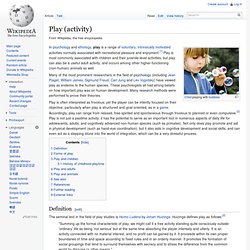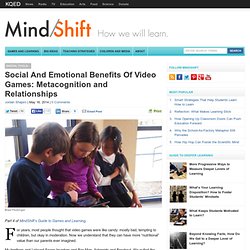

A Neurologist Makes the Case for the Video Game Model as a Learning Tool. The popularity of video games is not the enemy of education, but rather a model for best teaching strategies.

Games insert players at their achievable challenge level and reward player effort and practice with acknowledgement of incremental goal progress, not just final product. The fuel for this process is the pleasure experience related to the release of dopamine. Dopamine Motivation The human brain, much like that of most mammals, has hardwired physiological responses that had survival value at some point in evolutionary progression. The dopamine-reward system is fueled by the brain's recognition of making a successful prediction, choice, or behavioral response. Dopamine is a neurotransmitter that, when released in higher than usual amounts, goes beyond the synapse and flows to other regions of the brain producing a powerful pleasure response. No Pain, No Gain The survival benefit of the dopamine-reward system is building skills and adaptive responses. Play (activity) In psychology and ethology, play is a range of voluntary, intrinsically motivated activities normally associated with recreational pleasure and enjoyment.[1] Play is most commonly associated with children and their juvenile-level activities, but play can also be a useful adult activity, and occurs among other higher-functioning (non-human) animals as well.

Many of the most prominent researchers in the field of psychology (including Jean Piaget, William James, Sigmund Freud, Carl Jung and Lev Vygotsky) have viewed play as endemic to the human species. These psychologists all had strong beliefs on how important play was on human development. Many research methods were performed to prove their theories. Play is often interpreted as frivolous; yet the player can be intently focused on their objective, particularly when play is structured and goal-oriented, as in a game. The seminal text in the field of play studies is Homo Ludens by Johan Huizinga.
Children playing in a sandbox. Social And Emotional Benefits Of Video Games: Metacognition and Relationships. Brad Flickinger Part 4 of MindShift’s Guide to Games and Learning.

For years, most people thought that video games were like candy: mostly bad, tempting to children, but okay in moderation. Now we understand that they can have more “nutritional” value than our parents ever imagined. My brothers and I played Space Invaders and Pac Man, Asteroids and Breakout. We pulled the plastic casing off the Atari joystick and stuck the accordioned bottom end to our foreheads like a suction cup. Kids played video games for hours. Along came Oregon Trail, Reader Rabbit, Math Blaster, and others. Clearly, the world has changed considerably since then. Rage-quitting: Feelings of failure, not violent content, foster aggression in video gamers. The disturbing imagery or violent storylines of videos games like World of Warcraft or Grand Theft Auto are often accused of fostering feelings of aggression in players.

But a new study shows hostile behavior is linked to gamers' experiences of failure and frustration during play -- not to a game's violent content. The study is the first to look at the player's psychological experience with video games instead of focusing solely on its content. Researchers found that failure to master a game and its controls led to frustration and aggression, regardless of whether the game was violent or not. The findings of the study were published online in the March edition of the Journal of Personality and Social Psychology.
That experience is not unique to gaming, says coauthor Richard Ryan, a motivational psychologist at the University of Rochester. In one experiment, undergraduates held their hand in a bowl of painfully cold water for 25 seconds. Edward L. Kartik Ayyar's answer to Life Lessons: What are some lessons learned through playing World of Warcraft that are useful in other parts of life. The Surprising Truth About Moving Others. John Seely Brown on Motivating Learners (Big Thinkers Series) Edward Castronova. Violent Video Games Not So Bad When Players Cooperate. Violent Video Games Not So Bad When Players Cooperate COLUMBUS, Ohio – New research suggests that violent video games may not make players more aggressive – if they play cooperatively with other people.

In two studies, researchers found that college students who teamed up to play violent video games later showed more cooperative behavior, and sometimes less signs of aggression, than students who played the games competitively. The results suggest that it is too simplistic to say violent video games are always bad for players, said David Ewoldsen, co-author of the studies and professor of communication at Ohio State University.
“Clearly, research has established there are links between playing violent video games and aggression, but that’s an incomplete picture,” Ewoldsen said. “Most of the studies finding links between violent games and aggression were done with people playing alone. The new research suggests playing a violent game with a teammate changes how people react to the violence. Daphne Bavelier: Your brain on video games. Stanford's Sapolsky On Depression in U.S. (Full Lecture) Video game controversies. Video game controversies are unresolved societal and scientific arguments about whether or not the content of video games can change the behavior and attitudes of a player.

Since the early 1980s, advocates of video games have emphasized their use as an expressive medium, arguing for their protection under the laws governing freedom of speech and also as an educational tool. Dopamine Jackpot! Sapolsky on the Science of Pleasure.